高考、专升本英语---名词部分
英语专升本语法基础知识大全
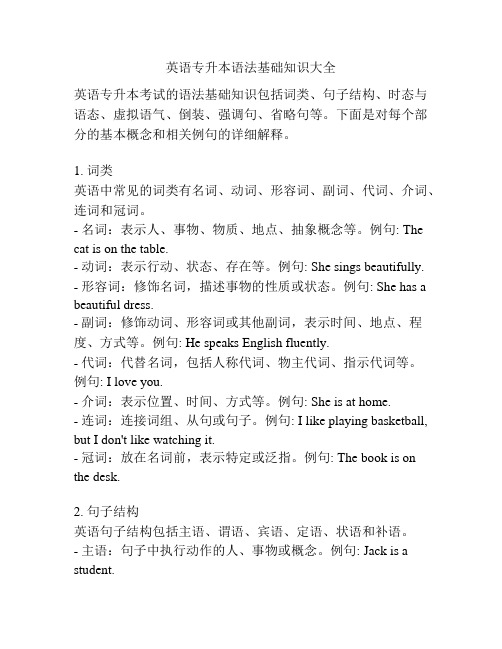
英语专升本语法基础知识大全英语专升本考试的语法基础知识包括词类、句子结构、时态与语态、虚拟语气、倒装、强调句、省略句等。
下面是对每个部分的基本概念和相关例句的详细解释。
1. 词类英语中常见的词类有名词、动词、形容词、副词、代词、介词、连词和冠词。
- 名词:表示人、事物、物质、地点、抽象概念等。
例句: The cat is on the table.- 动词:表示行动、状态、存在等。
例句: She sings beautifully. - 形容词:修饰名词,描述事物的性质或状态。
例句: She has a beautiful dress.- 副词:修饰动词、形容词或其他副词,表示时间、地点、程度、方式等。
例句: He speaks English fluently.- 代词:代替名词,包括人称代词、物主代词、指示代词等。
例句: I love you.- 介词:表示位置、时间、方式等。
例句: She is at home.- 连词:连接词组、从句或句子。
例句: I like playing basketball, but I don't like watching it.- 冠词:放在名词前,表示特定或泛指。
例句: The book is on the desk.2. 句子结构英语句子结构包括主语、谓语、宾语、定语、状语和补语。
- 主语:句子中执行动作的人、事物或概念。
例句: Jack is a student.- 谓语:句子中说明主语动作或状态的部分。
例句: The cat is sleeping.- 宾语:接受动作的对象。
例句: She bought a book.- 定语:修饰名词或代词的词组或从句。
例句: I like the blue car.- 状语:修饰动词、形容词或副词的词组或从句。
例句: He waited patiently.- 补语:用来补充说明主语或宾语的信息。
例句: She is a teacher.3. 时态与语态- 时态:表示动作或状态发生的时间。
专升本英语名词正式ppt课件

poetry(诗歌总称 ) machinery(机器总称 ) work(工作 ) laughter(笑声 ) permission(允许 ) clothing(衣裳总称 ) luggage, baggage(行李 ) bread(面包 ) hair( 头发)
几个名词的特殊用法
hair _H_i_s_h__a_ir_i_s_w__h_it_e_. (他的头发是白的。) _H_e__h_a_s__a_f_e_w__g_re_y__h_a_ir_s__. (他有几根白的 头发。)
英语中有许多对词,一个可数,一个不可数。
a poem(一首诗 ) a machine(一台机器 ) a job(一件工作 ) a laugh(一个笑声 ) a permit(许可证 ) a garment (一件衣裳 ) a bag(case) (一件行李 ) a loaf (一只面包 ) a hair(一根头发 )
属格 形式 's属格
应用场合
用在表示有生命的名词后
用在时间名词后 用在距离,长度名词后 用在地点名词后
举例 Tom and Mike's room(两人共有 Tom别's所an有d )Mike's rooms(两人分 three weeks' leave, today's
Notes: *1:stomach
stomachs
*2:以元音+y或以专有名词+y结尾的名词,直接在词尾加-s.
Eg:boys; toys; Henrys
*3: 以元音+o eg: videos; studios 以oo结尾 eg: zoos; bamboos;kangaroos 一些外来词(特别是音乐方面的词) eg: pianos 一些缩写词 eg: kilos; photos; memos 一些专有名词 eg: Eskimos; Filipinos
专升本英语语法讲义
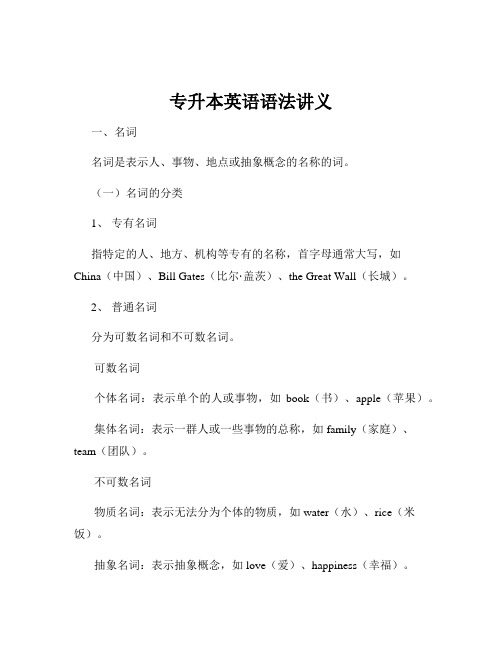
专升本英语语法讲义一、名词名词是表示人、事物、地点或抽象概念的名称的词。
(一)名词的分类1、专有名词指特定的人、地方、机构等专有的名称,首字母通常大写,如China(中国)、Bill Gates(比尔·盖茨)、the Great Wall(长城)。
2、普通名词分为可数名词和不可数名词。
可数名词个体名词:表示单个的人或事物,如book(书)、apple(苹果)。
集体名词:表示一群人或一些事物的总称,如 family(家庭)、team(团队)。
不可数名词物质名词:表示无法分为个体的物质,如 water(水)、rice(米饭)。
抽象名词:表示抽象概念,如 love(爱)、happiness(幸福)。
(二)名词的数1、可数名词的复数形式一般在名词后加 s,如 books,apples。
以 s,x,ch,sh 结尾的名词,加 es,如 buses,boxes,watches,dishes。
以辅音字母+ y 结尾的名词,把 y 变为 i 再加 es,如 city cities,baby babies。
但以元音字母+ y 结尾的名词,直接加 s,如 boy boys,day days。
以 f 或 fe 结尾的名词,把 f 或 fe 变为 v 再加 es,如 knife knives,leaf leaves。
但有些词直接加 s,如 roof roofs,chief chiefs。
不规则变化,如 man men,woman women,child children,foot feet,tooth teeth 等。
2、不可数名词的量化不可数名词要表示数量,需要用量词短语,如 a piece of paper(一张纸),a cup of coffee(一杯咖啡),two bottles of water(两瓶水)。
(三)名词的所有格1、表示有生命的名词的所有格一般在名词后加's,如 Tom's book(汤姆的书)。
成人高考-专升本英语复习资料大全 (1)

专升本英语词汇和语法考点总结词汇一、名词和代词一)重点名词和代词辨析1、result,effect,outcome,ending,consequence,fruitresult 普通用词,多指好的结果.另:比分,成绩;effect 名词:效果,影响。
动词:实现;outcome 多指成就,成果;ending 结局,结尾;consequence 多指不良的结果,后果;fruit 水果,产物。
2、feature,appearance,virtue,character,characteristicsfeature 1,特色,2,面貌,相貌;appearance1,出现,露面2,外观,外貌,外表;virtue 1,美德,2,优点,长处;character特征,品质,角色;characteristics 特性,特色。
3、accident,incident,event,conflict,trouble,occurrence,crash,crisis accident 事故,意外。
意想不到的事情,往往引起损伤或伤害;incident事件,小插曲。
事变(外交,政治中的政变);event 特指重大事件;conflict冲突,矛盾;trouble烦恼,麻烦;occurrence 1,发生,出现。
2,突发事件;crash使(飞机)坠毁、使(车辆)猛撞等;crisis危机,紧急关头。
4、currency,income,wage,bonus,salary,award,reward,fee,allowance,honour,benefit,profit,interest,prize,wealth,capital,money,cash,coin,fund,debt,loancurrency 流通货币,经济学用词;Income泛指收入;Wage 特指工资;Bonus指提成的奖金;Salary = wage + bonus 薪水;Award授予的奖项,包括奖励的奖金;Reward 回报,报酬,酬金;Fee泛指费用;Allowance 表示津贴,补贴;honour 荣誉,名誉。
专升本英语名词词组和固定搭配

专升本英语名词词组和固定搭配1、介词+名词a variety of 种种,各种after a while 过了一会,不久as a matter of fact 其实,事实上as a result of 由于……结果as a result 结果,因此as a rule 规章,规则;通常,照例as regards 关于,至于at (the)best 充其量,至多at a loss 困惑,不知所措at a time 每次,一次at all costs 不惜任何代价at all events 无论如何at any rate 无论如何,至少at first sight 乍一看,初看起来at hand 在手边,在附近at heart 在内心;实质上at home 在家,在国内;自在,自如at intervals 不时,时时at last 最终,终于at least 至少,最低限度at length 终于,最后;详细地at no time 从不,决不at one time 同时,曾经,从前曾at present 目前,现在at random 随意地,任意地at the cost of 以……为代价at the mercy of 在……支配下at the moment 现在,此刻at the same time 但是,然而at times 有时at work 上班by accident 偶然by all means 无论如何,必定by chance 偶然,碰巧by hand 用手by heart 牢记,凭记忆by means of 借助于,用by mistake 错误地by no means 决不by reason of 由于by the way 顺便提一下,另外by turns 轮流,交替by virtue of 由于by way of 经由,通过……方式for (the)purpose of 为了for a moment 片刻,一会儿for a while 暂时,一时for example 例如for instance 例如,举例说for the better 好转,改善for the moment 现在,暂时for the present 目前,暂时for the sake of 为了……起见for the time being 目前,暂时from time to time 有时,不时from tip to toe 彻头彻尾,完全hand down to 往下传,传给(后代)hand in hand 手拉手,携手in (the)future 今后,将来in a hurry 匆忙地,立即in a moment 立刻,马上in a way 在某点,在某种程度上in a word 一句话in addition to 除……之外in addition 另外in any case 无论如何,总之in any event 有效;实际上in case of 假使,万一in case 假使,以防(万一)免得in charge (of)负责,主管in common 共用,共有,共同in conclusion 最后,总之in confidence 信任in connection with/to 关于in consequence of 由于……的缘故in consequence 因此,结果in contrast with/to 与……成对照in danger 在危险中,垂危in debt 欠债in detail 详细地in difficulties 处境困难in fact 其实,实际上in favor of 有利于,赞成,支持in force 有效;实施中in front of 在……面前in general 通常,大体上in half 成两半in hand 在掌握中,在控制中in honor of 以纪念,向……表示敬意in line with 与……一致,按照in line 成一直线,排成一行in memory of 纪念in nature 本质上in no case 决不in no time 立即,马上in no way 决不in one's/the way 妨碍,阻碍in order that 以便in order to 以便,为了in order 秩序井然,整齐in other words 另……in particular 特别地,尤其,详细地in person 亲自in place of 代替in place 在适当的位置in practice 在实际中,实际上in proportion to (与……)成比例的in public 公开地,当众in question 正在考虑in return 作为报答,作为回报in secret 秘密地,私下地in sense 从某种意义上说in shape 处于良好状态in sight 被看到,在望in spite of 不管,不顾;尽管,虽然in step 同步,合拍in stock 现有,备有in sum 总而言之in tears 流着泪,含泪,哭in the air 在流行中,在传播中in the course of 在……过程中,在……期间in the distance 在远处in the event of 万一,如果发生in the face of 面对,不顾,即使in the first place 起初,首先in the last place 最后in the least 一点,丝毫in the light of 按照,根据in the long run 最终,从长远观点看in the past 在过去,以往in the way of 妨碍in time 及时,适时地in truth 事实上,实际上,的确in turn 依次,轮流in vain 徒劳,无效in/with relation to 关系到of course 当然,自然off duty 下班on (the)one hand ……一方面……,on (the/an)average 平均,一般来说on a large scale 大规模地on a small scale 小规模地on account of 因为,由于on board 在船(车、飞机)上on business 因公,因事on condition that 在……条件下on duty 值班,上班on earth 究竟,到底on fire 烧着on foot 步行on guard 警惕,防范on hand 在手边,临近on occasion 有时,不时on one's honor 以名誉担保on one's own 独自地,独立地on purpose 故意,有意on sale 出售;贱卖on the basis of 根据,在……的基础上on the contrary 反之,正相反on the other hand ……另一方面……,on the point 即将……的时候on the road 在旅途中on the second thoughts 经重新考虑,一转念on the side 作为兼职,额外on the spot 当场,在现场on the whole 总的来说on time 准时on top of 在……之上on try 试穿out of breath 喘不过气来out of control 失去控制out of danger 脱离危险out of date 过期(时)的out of order 发生故障,失调out of place 不得其所的,不适当的out of practice 久不练习,荒疏out of sight 看不见,在视野之外out of step 步调不一致,不协调out of touch 失去联系out of work 失业,下岗to the point 切中要害,切题under control 被控制住up to date 时新的with respect to 关于with the exception of ……之外with the purpose of 为了with/in regard to 对于,就……而论for one thing 首先,一则in terms of 依据,按照;用……措词2、动词+名词a great/ good deal of 大量(的),许多(的)a lot (of)许多(的),大量(的)a matter of (关于……)的问题a number of 若干,许多a series of 一系列,一连串action on 作用appeal to 呼吁,要求attempt at 企图,努力attitude to / towards 态度,看法be friends with 对……友好,与……交上朋友bear/keep in mind 记住bring/carry into practice 实施,实行carry/bring into effect 使生效,使起作用catch fire 着火catch one's breath 屏息,歇口气catch one's eye 引人注目catch the sight of 发现,突然看见come to the point 说到要点,扼要地说come/go into effect 生效,实施come/go into force 生效,实施come/go into operation 使投入生产,使运转do/try one's best 尽力,努力fall in love with 相爱,爱上find fault 埋怨,挑剔get hold of 抓住,掌握get the best of 胜过get the better of 打败,智胜get/learn by heart 记住,背诵give rise to 引起,使发生give way 让路,让步have in mind 记住,考虑到,想到have/gain access to 可以获得have/gain an advantage over 胜过,优于influence on 影响interference in 干涉interference with 妨碍,打扰introduction to 介绍keep an eye on 留意,照看keep company with 与……交往,与……联系keep house 管理家务,做家务keep in touch 保持联系keep one's head 保持镇静keep one's word 遵守诺言keep track 通晓事态,注意动向keep/hold pace with 跟上,与……同步lead the way 带路,引路lose heart 丧失勇气,失去信心lose one's head 不知所措lose track 失去联系lots of 大量,很多make a /the difference 有影响,很重要make a face 做鬼脸make friends 交朋友,友好相处make fun of 取笑,嘲弄make one's way 前进,进行make progress 进步,进展make sense 讲得通,有意义make the best of 充分利用,妥善处理make up one's mind 下决心make use of 利用make way 让路,开路pave the way for 为……铺平道路pay attention to 注意play a part 起作用put in order 整理,检修put into effect 实行,生效put to use 使用,利用reply to 回答,答复take a chance 冒险一试take advantage of 利用,趁……之机take care of 照顾,照料take care 小心,当心take charge of 担任,负责take delight in 以……为乐take effect 生效,起作用take one's time 不急不忙,从容进行take place 发生,进行take the place of 代替take……into account 考虑throw/cast light on 使明白,阐明with delight 欣然,乐意地3、名词词组的其他形式a few 有些,几个a little 一点,稍,一些,少许ahead of time 提前all the time 一直,始终as matter of fact 实际情况,真相credit card 信用卡decline with thanks 婉言谢绝face to face 面对面地fair play 公平竞赛,公平对待heart and soul 全心全意I.D. card 身份证in demand 有需要,销路好little by little 逐渐的next door 隔壁no doubt 无疑,必定no matter 无论no more 不再no wonder 难怪,怪不得once in a while 偶尔,有时once upon a time 从前out of doors 在户外primary school 小学quite a few 还不少,有相当数目的quite a little 相当多,不少rest room 厕所,盥洗室side by side 肩并肩,一个挨一个step by step 逐步the moment (that)一……就word for word 逐字地。
专升本英语-名词
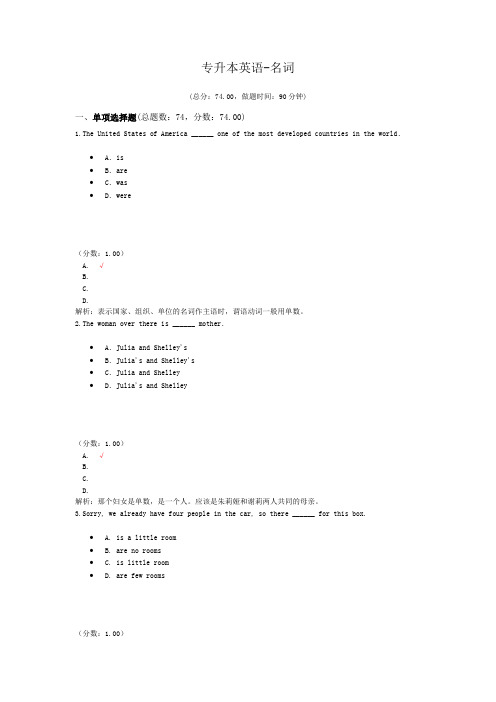
专升本英语-名词(总分:74.00,做题时间:90分钟)一、单项选择题(总题数:74,分数:74.00)1.The United States of America ______ one of the most developed countries in the world.∙A.is∙B.are∙C.was∙D.were(分数:1.00)A. √B.C.D.解析:表示国家、组织、单位的名词作主语时,谓语动词一般用单数。
2.The woman over there is ______ mother.∙A.Julia and Shelley's∙B.Julia's and Shelley's∙C.Julia and Shelley∙D.Julia's and Shelley(分数:1.00)A. √B.C.D.解析:那个妇女是单数,是一个人。
应该是朱莉娅和谢莉两人共同的母亲。
3.Sorry, we already have four people in the car, so there ______ for this box.∙ A. is a little room∙ B. are no rooms∙ C. is little room∙ D. are few rooms(分数:1.00)A.B.C. √D.解析:显然room在这里表示“地方”,为不可数名词,A和C可能正确;再由句意可知这里应表示否定意义,故用little.4.Dean and Carolyn always put small presents in ______ stockings on Christmas Day.∙ A. each other's∙ B. each other∙ C. each others∙ D. each others'(分数:1.00)A. √B.C.D.解析:这句话的意思是:在圣诞节,迪安和卡罗琳总是在彼此的长袜里放小礼物。
专升本英语名词语法

专升本英语名词语法专升本英语名词语法主要包括名词的单复数形式、所有格和冠词用法等方面。
1. 名词的单复数形式:- 大部分名词在单数形式时前面没有加任何词尾,如book (书),child(孩子)。
- 大部分名词在复数形式时,在词尾加-s,如books(书),children(孩子们)。
- 以-s、-x、-ch、-sh、-o结尾的名词,在复数形式时,在词尾加-es,如boxes(盒子),watches(手表),branches(分支),bushes(灌木),potatoes(土豆)。
- 以f或f结尾的名词,在复数形式时,一般将f或fe变为v,再加-es,如lives(生活,复数形式)、knives(刀子,复数形式)。
2. 名词的所有格形式:- 一般情况下,名词的所有格形式加-apostrophe 和 -s,如Tom's book(汤姆的书),the children's toys(孩子们的玩具)。
- 对于以-s或-es结尾的复数名词,在所有格形式时,只需加-apostrophe,不加-s,如the students' books(学生们的书)。
- 对于以-s结尾的复数名词或复数形式的人名,如果在所有格后面还有一个后缀的话,只需加-apostrophe即可,如the boys' school(男孩们的学校),the Joneses' car(琼斯一家的车子)。
3. 冠词用法:- 不定冠词"a"和"an"用在单数可数名词前,表示某一个不特指的人或物。
- 定冠词"the"用在可数名词和不可数名词前,表示特指的人或物。
- 不用冠词的情况包括泛指的名词(代表整个类别,如Dogs are animals. 狗是动物)、专有名词(如John, London)、抽象名词(如honesty, love)、一些固定短语(如in bed, at home)等。
成人高考专升本英语词汇3800

成人高考专升本英语词汇主要涵盖常见的高中英语词汇和一些基础的大学英语词汇。
以下是一些可能有助于备考的成人高考专升本英语词汇:1. 基础词汇:- analyze 分析- evaluate 评估- interpret 解释- demonstrate 展示- summarize 总结- acquire 获得- integrate 整合- differentiate 区分- hypothesis 假设- perspective 视角2. 动词短语:- come up with 提出- carry out 执行- figure out 弄清楚- point out 指出- put forward 提出- take into account 考虑到- be aware of 意识到- be capable of 能够- be concerned about 关心 - be familiar with 熟悉3. 形容词和副词:- significant 重要的- comprehensive 全面的- efficient 高效的- accurate 准确的- essential 必要的- gradually 逐渐地- thoroughly 彻底地- precisely 精确地- constantly 不断地- effectively 有效地4. 名词:- phenomenon 现象- innovation 创新- perspective 观点- analysis 分析- consequence 结果- solution 解决方案- challenge 挑战- benefit 利益- priority 优先权- requirement 要求请注意,以上词汇只是示例,具体的考试内容可能会有所不同。
建议您参考相关教材、题库和模拟试卷,以获取更具体和准确的备考资料。
专升本英语考试词汇名词专项练习(带答案)

第一节名词1.From the same fact we drew different.A.ideasB.theoriesC.resultsD.conclusions2.It is reported that the two prime ministers have already met on many.A.situationsB.circumstancesC.casesD.occasions3.Does anyone of you have a(n)?A.advicermationC.adviseD.suggestion4.—Paul has gone abroad to try his luck.—In my______,his decision is not wise.A.wordB.viewC.sightD.way5.As is well known,the brain performs a very important_______,which controls the nerve system of the body.A.motionB.actionC.functionD.fact6.Recently CCTV Station has taken great pains to make a program that reviews the important_____of2008.A.affairsB.eventsC.mattersD.things7.We can see the blue sky and the shining sun.There is no_____that it will rain today.A.doubtB.avenueC.chanceD.point8.There are twenty-four_____students in our class and we have three_____teachers.A.girl;womanB.girls;womenC.girl;womenD.girls;woman9.I refuse to lie about it;it’s against my_____.A.ambitionsB.principlesC.regulationsD.opinions10.He is such a man of many that all of us respect him.A.abilityB.abilitiespetenceD.talent11.—I want to go to the post office,but I’m afraid I’m not going in the right_____.—_____.Go ahead.A.way;NoB.distance;NoC.direction;YesD.side;Yes12.He managed to reach the summit of his career,but it was at the of his health.A.consumptionB.creditC.exhaustionD.expense13.In France it is the_______to shake hands with people in the office every morning.A.customB.behaviorC.habitD.act14.As we all know,the Internet will let people have to huge amounts of information from their own homes.A.entranceB.wayC.meansD.access15.The financial crisis has put the world economy in a difficult______.A.occasionB.conditionC.evaluationD.situation16.—Jack Brown is very clever and he studies hard as well.—No________he comes out first in the exams.A.answerB.questionC.wonderD.problem17.—She got her first science fiction published.It turned out to be_________.—When was that?—It was in2008__________she was still in college.A.success;thatB.a success;whenC.success;whenD.a success;that18.The US President Barack Obama is expecting the economy to show some_________of recovery.A.attemptsB.signsC.contentsD.waves19.The_______is just around the corner and you won’t miss it.A.shoe’s shopB.shoe shopC.shoes shopD.shoes’shop20.What the expert has said and done will be_______to the department managers.A.valueB.benefitC.of valuableD.of benefit21.It is a spectacular_______as the fireworks are set off and light up the whole sky during the Spring Festival.A.lookB.viewC.sceneryD.sight22.The Chinese are looking forward to the first_______to land on the moon after three Chinese astronauts’successful trip to space.A.measureB.attemptC.purposeD.desire23.She is in a poor of health,which worries her mother much.A.positionB.situationC.stateD.condition24.The experiment turned out to be________,which wasn’t______they wanted.A.a completely failing;asB.a complete failure;whatpletely failure;thatD.failed;不填25.The idea sounds good in theory,but it is useless if not put into_____.A.factB.eventC.deedD.practice26.I’m very grateful to you because you have taken_____to show me how to do the work.A.effortsB.painsC.attemptsD.difficulties27.—Would you like to go out for dinner with me,Ann?—Of course,but the only_____is that you’ll be my guest.A.positionB.instructionC.conditionD.invitation28.Mr.Zhang has taught for thirty years.Everybody sings high praise for his_____to the cause of education.A.applicationB.impressionC.receptionD.devotion29.—Do you think Mary is competent to be an interpreter?—Sure.She once studied in Australia and has a good_____of English.A.needmandC.recognitionD.standard30.As an excellent translator,he reached a high level of_____in his English.petenceB.independenceC.intelligenceD.experience31.There’s a_____in our class that we have a party on New Year’s Eve.A.TraditionB.balanceC.concernD.relationship32.The young dancers looked so charming in their beautiful clothes that we took_____pictures of them.A.many ofB.masses ofC.the number ofD.a large amount of33.I am sure David will be able to find the library he has a pretty good______of direction.A.ideaB.feelingC.experienceD.sense34.—The village is far away from here indeed.-It's______walk.A.a four hourB.a four hour'sC.a four-hoursD.a four hours'35.It took us quite a long time to get there.It was______journey.A.three-hourB.a three hourC.a three-hourD.three hours36.The______is just around the corner and you won't miss it.A.bicycle's shopB.bicycle shopC.bicycles shopD.bicycle's shop37.If you are not yet______,you are forbidden to visit this site.A.eighteen yearsB.at age of eighteenC.eighteen-year-oldD.eighteen years of age38.His behavior at the party last night seemed rather______.Many of us were quite surprised.A.out of practiceB.out of placeC.out of politenessD.out of pity39.If you don't take away all your things from the desk,there won't be enough______for my stationery.A.areaB.placeC.roomD.surface40.If the boss wants to fire me,he has to give me two months'______rmationB.adviceC.messageD.notice41.The school advisers help you talk through your problems but they don’t give you any direct________.A.solutionB.targetC.measureD.functionst year the number of students who graduated with a driving license reached200,000,a(n)________of40,000per year.A.averageB.numberC.amountD.quantity43.An experienced doctor usually judges a patient’s illness according to the various________.A.signsB.symptomsC.signalsD.appearances44.Which is the way to the__________?A.shoe factoryB.shoes factoryC.shoe’s factoryD.shoes’factory45.We will have a_________holiday after the exam.A.two monthB.two-monthC.two month’sD.two-months46.There is no enough________on the corner to put the table.A.placeB.roomC.floorD.ground47.The manager has got a good business_______so the company is doing well.A.ideaB.senseC.thoughtD.thinking48.The_______is just around the corner and you won't miss it.A.bicycle's shopB.bicycle shopC.bicycles shopD.bicycles'shop49.What he has done is far from_______.A.satisfactoryB.satisfiedC.satisfactionD.satisfy50.You'll find this map of great_______in helping you to get round London.A.priceB.costC.valueefulness51.You can take as many as you like because they are free of_______.A.fareB.chargeC.moneyD.pay52.A_______will be offered to information leading to the arrest(逮捕)of the bank robber.A.priceB.findC.rewardD.profit53.Do you know the_______of the saying I just quotedA.sourceB.resourceC.courseD.cause54.Those football players had no strict_______until they joined our club.A.practicecationC.exerciseD.training55.Many countries are increasing their use of natural gas,wind and other forms of_______.A.energyB.sourceC.powerD.material56.Here's my card.Let's keep in_______.A.touchB.relationC.connectionD.friendship57.Some famous singers live on the_______from their record sales.A.salaryB.valueC.billD.income58.For years scientists have been worried about the_____of air pollution on the earth’s natural conditions.A.effectB.resultC.accountD.cause59.How did you like the of the interpreter(口译员)at the Chinese FM press conference of 6-party talks on TV?A.performance B.achievement C.material D.words60.—I have just had my watch repaired.—How much did they for that?A.costB.chargeC.spendD.take61.Jane had prepared carefully for her English examination so that she could be sure of passing it on her first____________.A.intentionB.attemptC.purposeD.desire62.I hope my boss will take my recent illness into____when judging my performance at work.A.regardB.countingC.accountD.observation63.The_____,I think,he drew from his simple experiment is not scientific.A.conclusionB.chargeC.promiseD.relation64.If we go on using energy so wastefully,are our oil wells will be dried up before new energy sources can be found to replace oil.A.chancesB.difficultiesC.questionsD.problems65.The door and the windows were all closed and there was no______of forced entry.A.sceneB.showC.signD.sight66.Tom has been preparing carefully for the English examination,so that he can be sure of passing it at his firstA.requestB.attemptC.promiseD.purpose67.You didn't do anything wrong,—you should have a clear______.A.conscienceB.senseC.awarenessD.understanding68.Peasants earn their living by selling agriculture in China.A.cost B.food C.products D.production 69.The should be paid to the‘group’effort rather than the‘self’effort.A.effort B.attention C.energy D.strength70.When Paul saw the truck coming towards him,he stopped his car to make for it to pass. A.room B.a move C.an effort D.time71.Early______of a disease can prevent death and illness.A.edition B.immigration C.identification D.starvation72.There was______that thirteen people in all had taken part in planning the murder.A.account B.certificate C.evidence D.concept73.If you want to see a doctor,you fix a date with him ahead of time.That is a commonin the USA.A.sense B.practice C.rule D.reality74.Mr.Barret doesn’t think that all bad language should be allowed,In his opinion,there arethat should be kept up.A.degrees B.1evels C limits D.standards75.He stopped at a notice which“No before12noon”.A.read;admission B.wrote;permissionC.said;appreciation D.says;consideration76.As the proverb________,an enemy in disguise(伪装)is a wolf in sheep’s________. A.lies;dress B.says;clothes C.speaks;cloth D.goes;clothing 77.I try to make him understand that I’m not interested in him,but he never gets the. A.information B.news C.message D.word78.It was my_______that your cell phone was stolen.A.mistakeB.problemC.errorD.fault79.I’m not sure what the girl’s_______in the play is,but I think she will act the heroine.A.actressB.performanceC.roleD.demonstration80.He was extremely successful in his_______to write music that would please ordinary people.A.admirationB.ambitionC.motivationD.reputation第一节答案1—5DDDBC6—10BCCBB11—15CDADD16—20CBBBD 21—25DBCBD26—30BCDBA31—35ABDDC36—40BDBCD 41—45AABAB46—50BBBCC51—55BCADA56—60ADAAA 61—65BCAAC66—70DACBA71—75CAADA76—80DCDCB。
专升本英语名词词组和固定搭配

1、介词+名词by accident 偶然on account of 因为,由于in addition 另外in addition to 除......之外in the air 在流行中,在传播中on (the/an) average 平均,一般来说on the basis of 根据,在......的基础上at (the) best 充其量,至多for the better 好转,改善on board 在船(车、飞机)上[out of breath 喘不过气来on business 因公,因事in any case 无论如何,总之in case of 假使,万一in case 假使,以防(万一)免得in no case 决不by chance 偶然,碰巧in charge (of) 负责,主管(a) round the clock 昼夜不集地in common 共用,共有,共同:in conclusion 最后,总之on cond0ition that 在......条件下in confidence 信任in connection with/to 关于in consequence 因此,结果in consequence of 由于......的缘故on the contrary 反之,正相反in contrast with/to 与......成对照out of control 失去控制under control 被控制住)at all costs 不惜任何代价at the cost of 以......为代价in the course of 在...过程中,在...期间of course 当然,自然in danger 在危险中,垂危out of danger 脱离危险out of date 过期(时)的up to date 时新的in debt 欠债in debt 欠债\in detail 详细地in difficulties 处境困难in the distance 在远处off duty 下班on duty 值班,上班on earth 究竟,到底at all events 无论如何in any event 有效;实际上in the event of 万一,如果发生for example 例如:with the exception of ......之外in the face of 面对,不顾,即使in fact 其实,实际上on fire 烧着on foot 步行in force 有效;实施中in favo(u)r of 有利于,赞成,支持in front of 在......面前in (the) future 今后,将来on guard 警惕,防范}in general 通常,大体上in half 成两半at hand 在手边,在附近from tip to toe 彻着彻尾,完全by hand 用手hand down to 往下传,传给(后代)hand in hand 手拉手,携手in hand 在掌握中,在控制中on hand 在手边,临近on (the) one hand ... 一方面......,"on the other hand ... 另一方面......,at heart 在内心;实质上by heart 牢记,凭记忆at home 在家,在国内;自在,自如in honour of 以纪念,向......表示敬意on one's honour 以名誉担保in a hurry 匆忙地,立即for instance 例如,举例说at intervals 不时,时时at last 最终,终于、at least 至少,最低限度in the least 一点,丝毫at length 终于,最后;详细地in the light of 按照,根据in line 成一直线,排成一行in line with 与......一致,按照at a loss 困惑,不知所措as a matter of fact 其实,事实上by all means 无论如何,必定by means of 借助于,用|by no means 决不in memory of 纪念at the mercy of 在......支配下by mistake 错误地at the moment 现在,此刻for a moment 片刻,一会儿for the moment 现在,暂时in a moment 立刻,马上in nature 本质上on occasion 有时,不时[in order 秩序井然,整齐in order to 以便,为了in order that 以便out of order 发生故障,失调on one's own 独自地,独立地in particular 特别地,尤其,详细地in the past 在过去,以往in person 亲自in place 在适当的位置in place of 代替~in the first place 起初,首先in the last place 最后out of place 不得其所的,不适当的on the point 即将......的时候to the point 切中要害,切题in practice 在实际中,实际上out of practice 久不练习,荒疏at present 目前,现在for the present 目前,暂时in proportion to (与......)成比例的!in public 公开地,当众for (the) purpose of 为了on purpose 故意,有意with the purpose of 为了in question 正在考虑at random 随意地,任意地at any rate 无论如何,至少by reason of 由于as regards 关于,至于with/in regard to 对于,就......而论~in/with relation to 关系到with respect to 关于as a result 结果,因此as a result of 由于......结果in return 作为报答,作为回报on the road 在旅途中as a rule 规章,规则;通常,照例in the long run 最终,从长远观点看for the sake of 为了......起见on sale 出售;贱卖》on a large scale 大规模地on a small scale 小规模地in secret 秘密地,私下地in sense 从某种意义上说in shape 处于良好状态on the side 作为兼职,额外at first sight 乍一看,初看起来in sight 被看到,在望out of sight 看不见,在视野之外in spite of 不管,不顾;尽管,虽然¥on the spot 当场,在现场in step 同步,合拍out of step 步调不一致,不协调in stock 现有,备有in sum 总而言之in tears 流着泪,含泪,哭in terms of 依据,按照;用...措词for one thing 首先,一则on the second thoughts 经重新考虑,一转念at a time 每次,一次$at no time 从不,决不at one time 同时,曾经,从前曾at the same time 但是,然而at times 有时for the time being 目前,暂时from time to time 有时,不时in no time 立即,马上in time 及时,适时地on time 准时on top of 在......之上\out of touch 失去联系in truth 事实上,实际上,的确on try 试穿on try 试穿by turns 轮流,交替in turn 依次,轮流in vain 徒劳,无效a variety of 种种,各种by virtue of 由于by the way 顺便提一下,另外*by way of 经由,通过......方式in a way 在某点,在某种程度上in no way 决不in the way of 妨碍in one's/the way 妨碍,阻碍after a while 过了一会,不久for a while 暂时,一时on the whole 总的来说in a word 一句话in other words 另......;at work 上班out of work 失业,下岗in the world2、动词+名词have/gain access to 可以获得take...... into account 考虑have/gain an advantage over 胜过,优于pave the way for 为......铺平道路take advantage of 利用,趁......之机pay attention to 注意】do/try one's best 尽力,努力get the best of 胜过make the best of 充分利用,妥善处理get the better of 打败,智胜catch one's breath 屏息,歇口气take care 小心,当心take care of 照顾,照料take a chance 冒险一试take charge of 担任,负责keep company with 与......交往,与......联系)take delight in 以......为乐with delight 欣然,乐意地make a /the difference 有影响,很重要carry/bring into effect 使生效,使起作用put into effect 实行,生效come/go into effect 生效,实施take effect 生效,起作用catch one's eye 引人注目keep an eye on 留意,照看make a face 做鬼脸¥find fault 埋怨,挑剔catch fire 着火come/go into force 生效,实施make friends 交朋友,友好相处be friends with 对......友好,与......交上朋友make fun of 取笑,嘲弄keep one's head 保持镇静lose one's head 不知所措lose heart 丧失勇气,失去信心get/learn by heart 记住,背诵%get hold of 抓住,掌握keep house 管理家务,做家务throw/cast light on 使明白,阐明bear/keep in mind 记住have in mind 记住,考虑到,想到make up one's mind 下决心come/go into operation 使投入生产,使运转put in order 整理,检修keep/hold pace with 跟上,与......同步play a part 起作用<take place 发生,进行take the place of 代替come to the point 说到要点,扼要地说bring/carry into practice 实施,实行make progress 进步,进展give rise to 引起,使发生make sense 讲得通,有意义catch the sight of 发现,突然看见(go) on the stage 当演员take one's time 不急不忙,从容进行#keep in touch 保持联系keep track 通晓事态,注意动向lose track 失去联系make use of 利用put to use 使用,利用give way 让路,让步lead the way 带路,引路make one's way 前进,进行make way 让路,开路keep one's word 遵守诺言|action on 作用appeal to 呼吁,要求attempt at 企图,努力attitude to / towards 态度,看法a great/ good deal of 大量(的),许多(的)influence on 影响interference in 干涉interference with 妨碍,打扰introduction to 介绍a lot (of) 许多(的),大量(的)\lots of 大量,很多fall in love with 相爱,爱上a matter of (关于......)的问题a number of 若干,许多reply to 回答,答复a series of 一系列,一连串3、名词词组的其他形式trolley bus 电车. card 身份证credit card 信用卡】no doubt 无疑,必定next door 隔壁out of doors 在户外face to face 面对面地as matter of fact 实际情况,真相a few 有些,几个quite a few 还不少,有相当数目的a little 一点,稍,一些,少许little by little 逐渐的quite a little 相当多,不少no matter 无论the moment (that) 一......就no more 不再fair play 公平竞赛,公平对待in demand 有需要,销路好rest room 厕所,盥洗室primary school 小学side by side 肩并肩,一个挨一个heart and soul 全心全意step by step 逐步ahead of time 提前all the time 一直,始终once upon a time 从前once in a while 偶尔,有时no wonder 难怪,怪不得word for word 逐字地decline with thanks 婉言谢绝。
2024成人高考专升本《英语》考点知识点汇编复习资料(完整版)

第一部分语法知成考专升本英语-考点汇编识第一章名词一、可数名词的复数形式(一)、规则的变复数方法1、一般情况,直接+steacher---teachers ;student---students ;father---fathers ;mother---mothers2、s,x,ch,sh 结尾的单词+esdress---dresses ;box---boxes ;match---matches ;dish---dishes3、以辅音字母+y 结尾的单词:变y 为i,+escity---cities;baby---babies boy---boys*辅音字母判断方法:26个字母中,5个元音:A 、E 、I 、O 、U ,21个辅音:26-5=21个4、以“o”结尾的单词,(1)以"辅音字母+o"结尾的单数名词后+eshero---heroes;mango---mangoes;potato---potatoes;tomato---tomatoes(2)以"元音字母+o"结尾的单数名词后加+szoo---zoos bamboo----bamboos(3)某些外来词,只在词尾+sphoto----photos;piano----pianos5、以f 、f e 结尾的单词,(1)大多数变f 、f e 为“v”+es妻子:wife---wives小刀:knife---knives 狼:wolf---wolves小偷:thief---thieves架子:shelf---shelves自己:self---selves生命:life---lives一半:half---halves叶子:leaf---leaves(2)少部分直接+sroof---roofs屋顶;belief---beliefs信仰;proof---proofs证明;校样*记忆口诀:妻子拿刀去砍狼、小偷吓得发了慌、躲在架后保己命、半片树叶遮目光。
高考、专升本英语---名词部分
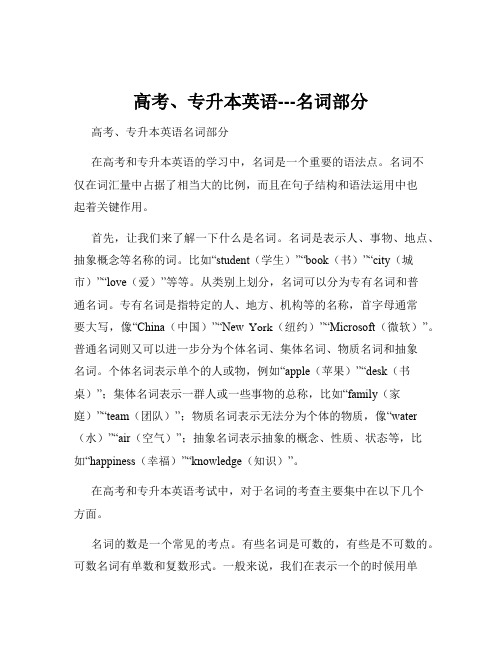
高考、专升本英语---名词部分高考、专升本英语名词部分在高考和专升本英语的学习中,名词是一个重要的语法点。
名词不仅在词汇量中占据了相当大的比例,而且在句子结构和语法运用中也起着关键作用。
首先,让我们来了解一下什么是名词。
名词是表示人、事物、地点、抽象概念等名称的词。
比如“student(学生)”“book(书)”“city(城市)”“love(爱)”等等。
从类别上划分,名词可以分为专有名词和普通名词。
专有名词是指特定的人、地方、机构等的名称,首字母通常要大写,像“China(中国)”“New York(纽约)”“Microsoft(微软)”。
普通名词则又可以进一步分为个体名词、集体名词、物质名词和抽象名词。
个体名词表示单个的人或物,例如“apple(苹果)”“desk(书桌)”;集体名词表示一群人或一些事物的总称,比如“family(家庭)”“team(团队)”;物质名词表示无法分为个体的物质,像“water (水)”“air(空气)”;抽象名词表示抽象的概念、性质、状态等,比如“happiness(幸福)”“knowledge(知识)”。
在高考和专升本英语考试中,对于名词的考查主要集中在以下几个方面。
名词的数是一个常见的考点。
有些名词是可数的,有些是不可数的。
可数名词有单数和复数形式。
一般来说,我们在表示一个的时候用单数,两个及以上的时候用复数。
比如“a book(一本书)”“two books(两本书)”。
但也有一些特殊情况,比如“man”的复数是“men”,“child”的复数是“children”。
不可数名词没有复数形式,比如“water”“rice”。
在使用时,要注意不可数名词前不能直接用 a/an ,如果要表示数量,需要借助一些量词,比如“a piece of paper(一张纸)”“a cup of coffee(一杯咖啡)”。
名词所有格也是经常出现的考点。
表示有生命的东西的名词所有格一般在名词后加's ,比如“Tom's book(汤姆的书)”。
专升本英语语法---名词性从句
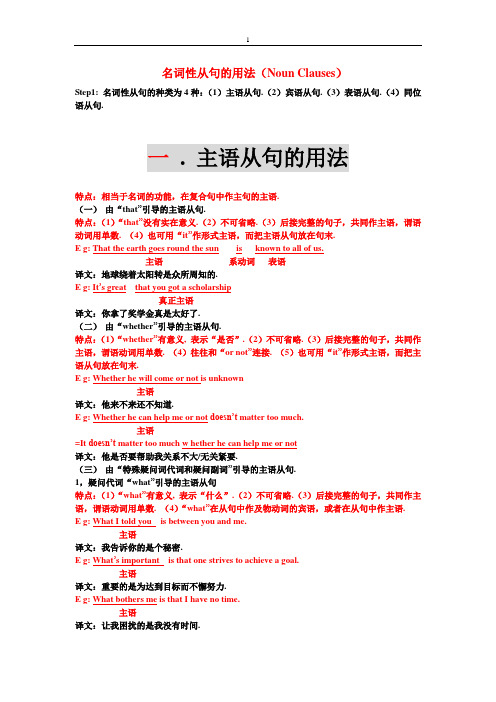
名词性从句的用法(Noun Clauses)Step1: 名词性从句的种类为4种:(1)主语从句.(2)宾语从句.(3)表语从句.(4)同位语从句.一. 主语从句的用法特点:相当于名词的功能,在复合句中作主句的主语.(一)由“that”引导的主语从句.特点:(1)“that”没有实在意义.(2)不可省略.(3)后接完整的句子,共同作主语,谓语动词用单数. (4)也可用“it”作形式主语,而把主语从句放在句末.E g:That the earth goes round the sun is known to all of us.主语系动词表语译文:地球绕着太阳转是众所周知的.E g:It’s great that you got a scholarship真正主语译文:你拿了奖学金真是太好了.(二)由“whether”引导的主语从句.特点:(1)“whether”有意义, 表示“是否”.(2)不可省略.(3)后接完整的句子,共同作主语,谓语动词用单数. (4)往往和“or not”连接. (5)也可用“it”作形式主语,而把主语从句放在句末.E g:Whether he will come or not is unknown主语译文:他来不来还不知道.E g:Whether he can help me or not doesn’t matter too much.主语=It doesn’t matter too much w hether he can help me or not译文:他是否要帮助我关系不大/无关紧要.(三)由“特殊疑问词代词和疑问副词”引导的主语从句.1,疑问代词“what”引导的主语从句特点:(1)“what”有意义, 表示“什么”.(2)不可省略.(3)后接完整的句子,共同作主语,谓语动词用单数. (4)“what”在从句中作及物动词的宾语,或者在从句中作主语.E g:What I told you is between you and me.主语译文:我告诉你的是个秘密.E g:What’s important is that one strives to achieve a goal.主语译文:重要的是为达到目标而不懈努力.E g:What bothers me is that I have no time.主语译文:让我困扰的是我没有时间.2,疑问代词“whatever”引导的主语从句特点:(1)“whatever”有意义, 表示“无论什么”.(2)不可省略.(3)后接完整的句子,共同作主语,谓语动词用单数. (4)“whatever”在从句中作及物动词的宾语,或者在从句中作主语.E g:Whatever is worth doing at all is worth doing well.主语译文:任何值得做的事情都值得把它做好.E g:Whatever he said is true.主语译文:他说的任何话都是真的.3,疑问代词“whoever”引导的主语从句特点:(1)“whoever”有意义, 表示“无论谁/任何人”.(2)不可省略.(3)后接完整的句子,共同作主语,谓语动词用单数. (4)“whoever”在从句中作作主语.E g:Whoever makes such a mistake should be punished.主语译文:凡犯此错的人都应受到惩罚.E g:Whoever wants to reach a distant goal must take many small steps.主语译文:不管是谁,要达到远期目标,都必须一步一步往前走.4,疑问代词“where/wherever”引导的主语从句特点:(1)“wherever”有意义, 表示“无论哪里”.(2)不可省略.(3)后接完整的句子,共同作主语,谓语动词用单数. (4)“wherever”在从句中作作状语.E g: Where we are going to spend the weekend hasn’t been decided yet.主语译文:我们打算去那里过周末还没有决定呢.二.表语从句的用法特点:相当于名词的功能,在复合句中作主句的表语,位于主句的系动词之后.(一)由“that”引导的表语从句.特点:(1)“that”没有实在意义.(2)不可省略.(3)后接完整的句子,共同作表语.E g:My biggest problem is that I can’t communicate with others freely.主语系动词表语从句译文:我最大的问题就是无法与别人自由交流.(二)由“whether”引导的表语从句.特点:(1)“whether”有意义,表示“是否”.(2)不可省略.(3)后接完整的句子,共同作表语.E g: What our parents are worried about is whether we will be able to build a better future主语系动词表语从句译文:我们父母所担心的是我们是否能够创建一个美好的未来.(三)由“特殊疑问词代词和疑问副词”引导的表语从句.1,疑问代词“what”引导的主语从句特点:(1)“what”有意义, 表示“什么”.(2)不可省略.(3)后接完整的句子,共同作表语,谓语动词用单数. (4)“what”在从句中作及物动词的宾语,或者在从句中作主语.E g:Luck is what happens when preparation meets opportunity.表语从句译文:幸运就是当一个做好准备的人遇到了机会.E g:Dreams are what you hope for ; reality is what you plan for.表语从句表语从句译文:梦想是的追求,现实是你的计划.2,疑问代词“whatever”引导的主表从句特点:(1)“whatever”有意义, 表示“无论什么”.(2)不可省略.(3)后接完整的句子,共同作表语. (4)“whatever”在从句中作及物动词的宾语,或者在从句中作主语.E g: The main problem is whatever he has done主语表语从句译文:主要问题是他到底做了什么事情.3,疑问代词“who/whoever”引导的表语从句特点:(1)“whoever”有意义, 表示“无论谁/任何人”.(2)不可省略.(3)后接完整的句子,共同作表语,谓语动词用单数. (4)“whoever”在从句中作作主语.E g: The main problem is who can take his place. He really is one of a kind主语表语从句译文:主要问题是谁能取代他的位置. 他真的是独一无二的.4,疑问副词“where/wherever”引导的表语从句特点:(1)“wherever”有意义, 表示“无论那里”.(2)不可省略.(3)后接完整的句子,共同作表语.(4)“wherever”在从句中作状语.E g: The main problem is where we can find a hotel now.主语表语从句译文:主要问题是现在我们到那里去找旅馆.5,疑问副词“how”引导的表语从句特点:(1)“how”有意义, 表示“无论如何”.(2)不可省略.(3)后接完整的句子,共同作表语. (4)“how”在从句中作方式状语.E g: The main problem is how we can solve such a tough problem.主语表语从句译文:主要问题是我们如何才能解决这个棘手的问题.三.宾语从句的用法特点:相当于名词的功能,在复合句中作主句的宾语,位于主句的及物动词之后.(一)由“that”引导的宾语从句.特点:(1)“that”没有实在意义.(2)可省略.(3)后接完整的句子,共同作宾语.E g: I think(that) this food is out of this world主语及物动词宾语从句译文:我认为这道菜真是一绝.(二)“if”引导宾语从句的特点:(1)“if”有含义,表示“是否”.(2)不可省略.E g: I just wonder / if / she can /come to my birthday party/ tonight.主语状语谓语引导词宾语从句译文:我只是想知道今晚她是否来参加我的生日宴会.注意:“If”引导的宾语从句的用法与“whether”引导的宾语从句的用法的两点区别. (1)若句末没有出现“or not”, 两者可以互换.(2)若句末出现“or not”, 只能用“whether”.E g: I don’t know / if/ whether / my parents can/ come to the class meeting.(两者皆可)主句引导词宾语从句比较:I don’t know whether my parents can come to the class meeting or not.(只能用“whether”).(三)由疑问词引导的宾语从句.1, 由“what”引导的宾语从句特点:(1)“what”有实在意义,表示“什么”.(2)不可省略.(3)后接完整的句子,可以在宾语从句中作主语和宾语.E g: Y ou never know what you can do till you try主语及物动词宾语从句译文:如果不去尝试,你永远也不知道自己能做什么.E g: We never know what will happen to us in the distant future主语及物动词宾语从句译文:我们永远也不知道在遥远的将来到底发生什么情况.2 ,由“when”引导的宾语从句特点:(1)“when”有实在意义,表示“何时”.(2)不可省略.(3)后接完整的句子,可以在宾语从句中作时间状语.E g: The stranger doesn’t know when the ship arrives主语及物动词宾语从句译文:谋生人不知道轮船何时到达.3 ,由“where”引导的宾语从句特点:(1)“where”有实在意义,表示“何处”.(2)不可省略.(3)后接完整的句子,可以在宾语从句中作地点状语.E g: Could you please tell me where the nearest post office is?宾语从句译文:请你告诉告诉我最近的邮局在哪里吗?4,由“why”引导的宾语从句特点:(1)“why”有实在意义,表示“为什么”.(2)不可省略.(3)后接完整的句子,可以在宾语从句中作原因状语.E g: I didn’t understand why my boss was angry with me yesterday宾语从句译文:我不明白老板为什么昨天生我的气.5,由“how”引导的宾语从句特点:(1)“how”有实在意义,表示“如何”.(2)不可省略.(3)后接完整的句子,可以在宾语从句中作方式状语.E g: I don’t know how I can come up with such a good idea宾语从句译文:我不知道如何才能想出一个好的主意.6,由“who”引导的宾语从句特点:(1)“who”有实在意义,表示“谁”.(2)不可省略.(3)后接完整的句子,可以在宾语从句中作主语.E g: Could you tell me who is in charge of sales department?宾语从句译文:我不知道如何才能想出一个好的主意.7,由“whom”引导的宾语从句特点:(1)“whom”有实在意义,表示“谁”.(2)不可省略.(3)后接完整的句子,可以在宾语从句中作宾语.E g: He asked me whom I was waiting for宾语从句译文:他问我在等待谁.8,由“whose”引导的宾语从句特点:(1)“whose”有实在意义,表示“谁的”.(2)不可省略.(3)后接完整的句子,可以在宾语从句中作定语.E g: I can’t decide whose advice I should take宾语从句译文:我决定不了我应该采取谁的意见.9,由“which”引导的宾语从句特点:(1)“which”有实在意义,表示“哪一个、哪一些”.(2)不可省略.(3)后接完整的句子,可以在宾语从句中作定语.E g: Please tell me which class you are in宾语从句译文:请告诉我你在哪个班级.(四).宾语从句语序的用法.特点:若主句为一般疑问句,宾语从句的一定要用正常语序,也就是宾语从句的情态动词、系动词、助动词不能放在从句的主语前.E g: Can tell me if/whether I have the flu?宾语从句译文:你能不能告诉我我是不是得了流感?E g: Do you know where my mother went?宾语从句译文:你知道我妈妈去了哪里了吗?E g: Do you by any chance know why I was fired?宾语从句译文:你是否刚好知道我为什么被炒鱿鱼?(五).宾语从句否定转移的用法.特点:在感知动词,即:“think/believe/suppose/expect”等动词引导的宾语从句中,从句谓语动词尽管是否定意思,而把否定词转移到主句的谓语动词前.E g: I don’t believe you can finish the project alone宾语从句译文:我相信你一个人无法完成这个项目.E g: I don’t think you are right宾语从句译文:我想你不对.四.同位语从句的用法定义:用作同位语的从句叫做同位语从句。
英语名词专升本

英语名词专升本专升本英语中,名词可是个相当重要的部分!就像我们日常生活中的小伙伴,它们无处不在,却又常常被我们忽略。
先来说说啥是名词。
简单讲,名词就是表示人、事物、地点、现象等的名称的词。
比如说,“小明”“苹果”“北京”“爱情”,这些都是名词。
咱拿一个例子来说吧,有一次我去超市买东西,走到水果区,那琳琅满目的水果啊,什么“香蕉”“草莓”“橙子”,全都是名词。
我拿起一个红彤彤的苹果,心里想着:这“苹果”就是个名词呀,它代表着眼前这个实实在在的水果。
在专升本英语里,名词的种类可不少。
有普通名词,像“书”“桌子”“椅子”;有专有名词,比如“China”“New York”“Bill Gates”。
还有集体名词,像“family”“team”“crowd”,它们表示一群人或物的整体。
名词的数也是个重点。
有的名词只有单数形式,像“music”“advice”;有的只有复数形式,比如“scissors”“glasses”。
大多数名词呢,既有单数又有复数,复数形式的变化规则可得记清楚啦!比如说,一般情况下加“s”,“book”变成“books”;以“s”“x”“ch”“sh”结尾的加“es”,“box”就成了“boxes”。
还有名词所有格,这也是常考的点。
“Tom's book”表示“汤姆的书”,“the girls' room”表示“女孩子们的房间”。
再说说名词在句子中的作用。
名词可以作主语、宾语、表语等等。
比如“Apples are delicious” 这里“apples”就是主语。
学习名词的时候,可别死记硬背,要结合实际例子来理解。
就像我之前提到的在超市的经历,看到那些水果的名字,多想想它们的名词属性。
总之,专升本英语中的名词虽然看似简单,但是要真正掌握好,还需要我们多下功夫,多观察、多练习。
相信大家都能搞定这些名词,在专升本考试中取得好成绩!。
成人高考专升本英语词汇知识梳理-名词

成人高考专升本英语词汇知识梳理:名词
高端冲刺班:考点模块串讲班+考前核心卷+真题技巧班+题型总结+考前5页A4纸;单科=219元/科
立即报名
超级VIP套餐:高校规划指导+精讲班+强化班+模考+内部资料+应试技巧班+考前直播冲刺+套餐特色+套餐服务+考试不过重修2次!全科=1830元;立即报名
全程无忧套餐:精讲班+强化班+模考班+内部资料+应试技巧班+考前直播冲刺+套餐特色+套餐服务+考试不过,第二年免费重修!全科=1230元;立即报名
通关套餐:精讲班+强化班+模考班+内部资料+套餐特色+套餐服务;全科=680元立即报名。
成人高考专升本英语复习资料
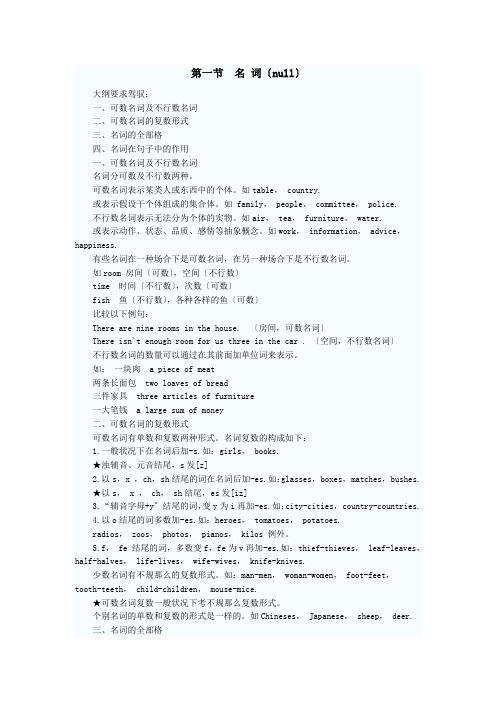
第一节名词〔null〕大纲要求驾驭:一、可数名词及不行数名词二、可数名词的复数形式三、名词的全部格四、名词在句子中的作用一、可数名词及不行数名词名词分可数及不行数两种。
可数名词表示某类人或东西中的个体。
如table, country.或表示假设干个体组成的集合体。
如 family, people, committee, police.不行数名词表示无法分为个体的实物。
如air, tea, furniture, water.或表示动作、状态、品质、感情等抽象概念。
如work, information, advice,happiness.有些名词在一种场合下是可数名词,在另一种场合下是不行数名词。
如room 房间〔可数〕,空间〔不行数〕time 时间〔不行数〕,次数〔可数〕fish 鱼〔不行数〕,各种各样的鱼〔可数〕比较以下例句:There are nine rooms in the house. 〔房间,可数名词〕There isn't enough room for us three in the car . 〔空间,不行数名词〕不行数名词的数量可以通过在其前面加单位词来表示。
如:一块肉 a piece of meat两条长面包 two loaves of bread三件家具 three articles of furniture一大笔钱 a large sum of money二、可数名词的复数形式可数名词有单数和复数两种形式。
名词复数的构成如下:1.一般状况下在名词后加-s.如:girls, books.★浊辅音、元音结尾,s发[z]2.以s, x , ch, sh结尾的词在名词后加-es.如:glasses, boxes, matches, bushes.★以s, x , ch, sh结尾,es发[iz]3.“辅音字母+y〞结尾的词,变y为i再加-es.如:city-cities, country-countries.4.以o结尾的词多数加-es.如:heroes, tomatoes, potatoes.radios, zoos, photos, pianos, kilos 例外。
- 1、下载文档前请自行甄别文档内容的完整性,平台不提供额外的编辑、内容补充、找答案等附加服务。
- 2、"仅部分预览"的文档,不可在线预览部分如存在完整性等问题,可反馈申请退款(可完整预览的文档不适用该条件!)。
- 3、如文档侵犯您的权益,请联系客服反馈,我们会尽快为您处理(人工客服工作时间:9:00-18:30)。
There are only two _____ in the hospital. A B. boys student .boy students C. boys students D. boy student
(4) 以o结尾的词: 加s: photo, radio, piano, zoo, studio,bamboo 加es: tomato, potato, hero, Negro 另:zero (zeros或 zeroes) (5) 以f或fe结尾的词: 直接加s:proofs;gulfs; cliffs; roofs;serfs; beliefs; chiefs;
加法 加-s 加-es 多数加-es 去y加-ies
例词 brothers; boys buses; watches;
以s,x,ch,sh,结尾的 词 以辅音+o 结尾的词 以辅音+y结尾的 词
dishes; boxes
heroes; tomatoes ladies;countries leaf-leaves;
(2) 集体名词
表示多个人或事物的总称 e.g. police people youth
(3) 物质名词
表示物质的名称,包括材料、液体、气体、食物、饮料等 e.g. gold wind food sugar sand
(4) 抽象名词
表示抽象概念的名称,包括表示性质、状态、情感等 Happiness knowledge information progress
(4) 有没有s结尾意义不同:
cloth(织物)–clothes(衣服) sand(沙,沙子 –sands(沙漠), time –times(时代), paper –papers(论文), experience(经验) –experiences(经历), custom(习惯)---customs(海关;关税) green(绿色)---greens(青菜)
Countable nouns (可数名词) Individual Nouns (个体名词)
Collective Nouns (集体名词 )
Uncountable nouns (不可数名词)
Abstract Nouns (抽象名词 ) Material Nouns (物质名词 )
(1) 个体名词
表示单个人或事物。 e.g. child street city teacher
a Japanese an American an Indian a Canadian
a German
two Japanese two Americans two Indians
two Canadians two Germans
英国人
瑞典人
the English
the Swedish
an Englishman
以f或fe结尾的词
把f/fe改成ves
knife-knives
, fish, works(工厂), Chinese, Japanese
(2)改变字母:man --men, woman --women, policeman --policemen, saleswoman --saleswomen, foot --feet, tooth --teeth, goose --geese, Mouse --Mice (3)增加字母: child --children, ox --oxen
safes 一个首领(chief)带着一个农奴(serf)在海湾(gulf)的悬崖 (cliff)上发现一个屋顶(roof)上面有个保险箱(safe)
另外:handkerchief (handkerchiefs或handkerchieves)
3.名词单复数的特殊情况:
(1)集体名词: police , cattle , people ,the youth
Saturday,Sunday
Janurary 一月, February 二月, March 三月, April 四月
May 五月, June 六月, July 七月, August 八月, September 九月
October 十月, November 十一月, December 十二月
普通名词
2014专升本英语 Grammar 名 词
(Nouns)
名词考点分析
• • • • 1名词的分类 2名词的数(复数形式) 3名词的格(所有格) 4名词的语法功能
一、名词的分类
A:专有名词 (Proper nouns) B:普通名词 (Common nouns)
专有名词
特指人或事物的名称,首字母必须大写,包括人名、地 名、书名、月份、星期、组织结构名称等。 Monday,Tuesday,Wednesday,Thursday,Friday,
(2) 只有复数形式的名词:
clothes, trousers, jeans, twins, glasses, compasses (指南针), scissors(剪刀),
(3) 以s结尾但不表示复数: mathematics数学, physics物理学, politics政治, statistics统计学, news新闻,works(工厂)
6.名词只能用复数形式的短语:
• • • • • • • • • •
do exercises (做操) take notes (做笔记) take turns (轮流) make repairs (搞修理) change trains (改换火车) make friends with (交朋友) shake hands with (握手) as follows (如下) in rags (衣衫褴褛) in dozens (成打的)
③含boy, girl, lady等的合成的名词: 它们始终为单数,其后的名词则用复数形式。 如: boy students, girl friends, lady drivers ④含man或 woman的合成名词: 它们随其后名词单复数的变化而变化。如: a man doctor, two men doctors
国籍的单复数 Some ______ visited our school last Wednesday. A.German B.Germen C D.Germens .Germans
(5) 姓氏后加s并带冠词,表一家人或夫妇俩:
the Greens ;the Chengs
4.关于国籍的单复数变化
• (1) 单复数同形如:Chinese, Japanese等。 当它们与定冠词连用时,表示复数或总称。 a) The Chinese are hard-working.
• (2) 变man 为men。如:Englishman, Frenchman, Dutchman等。 an Englishman-----------two Englishmen a Frenchman ----------- two Frenchmen a Dutchman ----------- two Dutchmen
单复数相同的情况: sheep; deer; means; fish; works; Chinese;Japanese 以及由汉语音译表示度量衡、货币等单位的名词。
Eg: yuan, jiao, fen, jin, mu
Mr Smith has two ______, both of whom are teachers in a school. A.brothers-in-law B.brother-in-laws C.brothers-in-laws D.brothers-in law
二、名词的数
可数名词表示可以用具体数字来计算的 人、事物和概念的普通名词,有单数和 复数之分。可数名词的复数形式的构成 方法有规则变化和不规则变化。 A: Singular number (单数) B: Plural number (复数)
规则变化 不规则变化
1.规则名词单复数变化:
情况
一般情况,包括元音 字母加y结尾的词
It took us quite a long time to get here. It was a________ journey. A. three-hour B. a three hour C. a three-hour D. three hours “数词+名词”构成的合成词作定语时,这个名词 一般保留单数形式。 如: a ten-mile walk; a fiveyear plan 但是如果不用连字符,就需用复数的所有格。
There are only twelve _____ in the hospital. A.woman doctors B.women doctors C.women doctor D.woman doctor man, woman, gentleman等作定语时,其单复数以 所修饰的名词的单复数而定。 如:a man worker → men workers a woman teacher → women teachers a gentleman official → gentlemen officials
(为…做贡献)
8.名词单复数意义不同的短语:
• • • •
Have a word with sb. (与…某人说句话) Have words with sb. (与…某人吵架) Make cloth (织布) Make clothes (制衣)
When the farmer returned home he found three ______ missing. A.sheeps B.sheepes C .sheep D.sheepies
